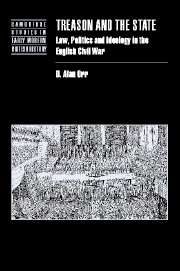Summary
In 1607 the civil lawyer John Cowell published The Interpreter, reputedly the first major attempt to compile a comprehensive legal dictionary in English. Cowell stated that “treason” came from the French “trahison” and that it “signifieth an offence committed against the amplitude and maiestie of the commonwealth.” “High Treason,” he continued, was “an offence done against the securitie of the commonwealth, or of the King's most excellent Maiestie.” The remainder of the entry went on, in rather uncontroversial fashion, to recapitulate the contents of 25 Edward III and outline the manner of punishments for convicted traitors. Modern scholars usually read Cowell in order to evaluate his alleged “absolutism,” paying particular attention to his controversial definition of the royal prerogative. However, his definition of treason as a crime against the commonwealth or common good – terms roughly analogous to the “state” in the English of the time – had far-reaching implications. While initially suppressed, the book eventually became a best seller in the seventeenth century and was reprinted as late as 1701 in a supposedly expurgated edition. Absolutist or not, the book was just too useful for practicing lawyers to discard, having no logical substitute in the professional literature of the day. Sir Edward Coke himself possessed a copy.
- Type
- Chapter
- Information
- Treason and the StateLaw, Politics and Ideology in the English Civil War, pp. 30 - 58Publisher: Cambridge University PressPrint publication year: 2002



